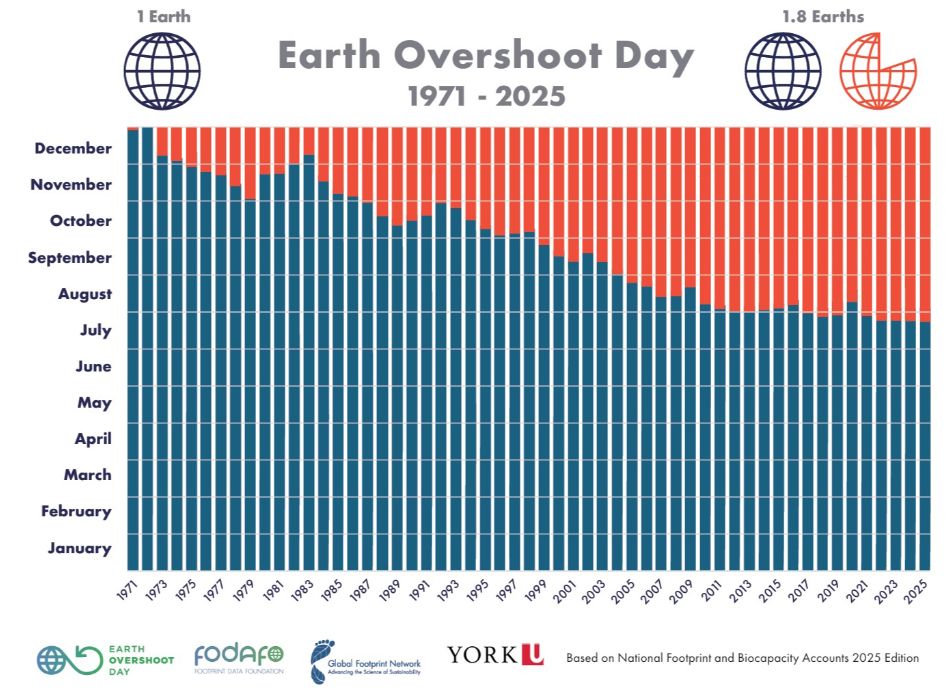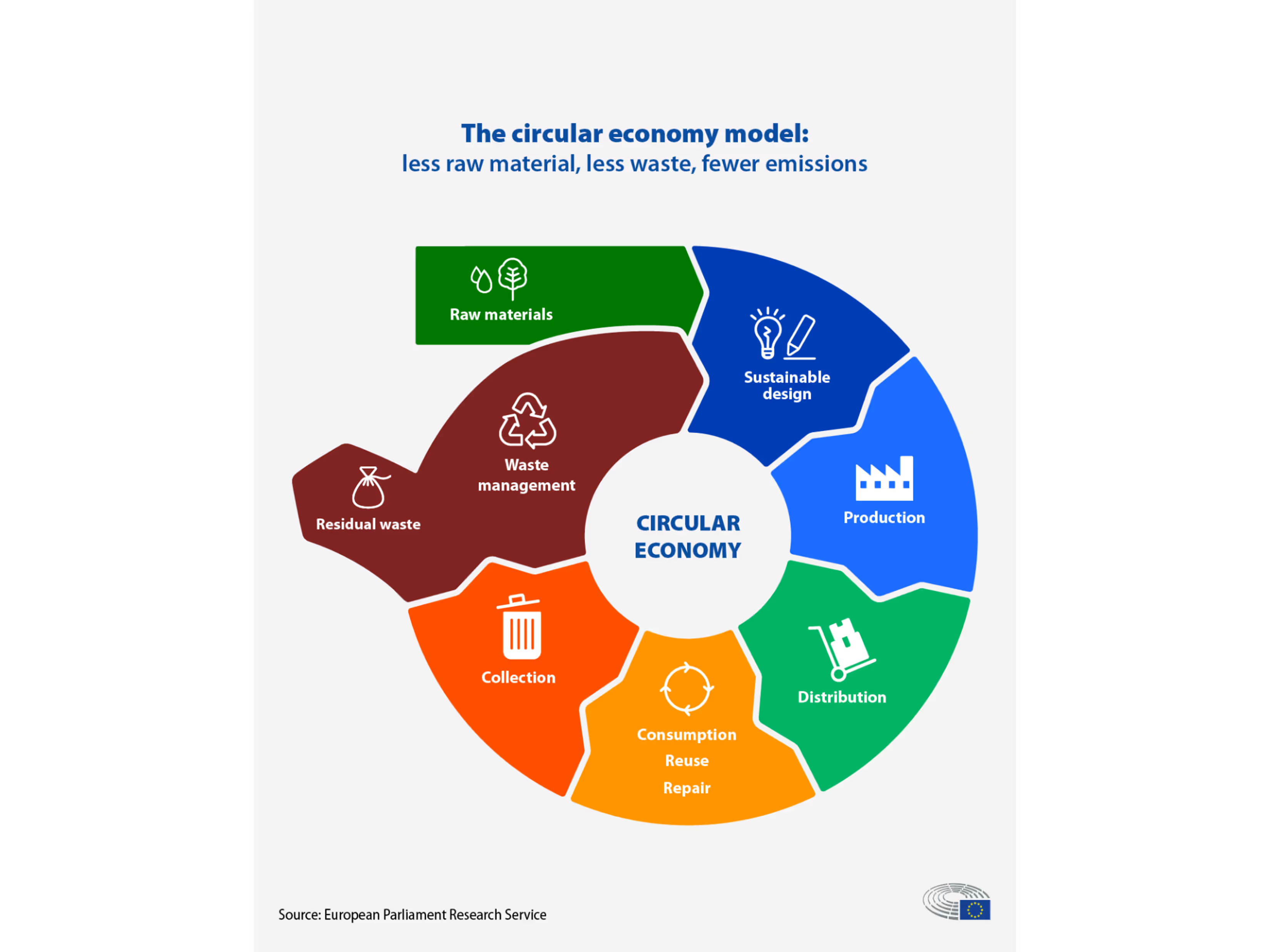How satisfying is it to buy something we don’t necessarily need? And how long does that feeling realistically last? Chances are, not very long. But the environmental impact? That lasts much longer. From depleting resources to carbon-heavy production, our habits of overconsumption are leaving behind more than just receipts.
Impacts of Overconsumption
Overconsumption can be described as one of the major contributors to climate change, significantly increasing greenhouse gas emissions and depleting resources at an alarming rate. (Wang and Azam 2023) When people consume more than they need, especially single-use or disposable products, they often end up in landfills, creating more waste. This is now becoming the new normal as our economic model is dependent on consumerism and has become the forefront to most of our daily lives. (Millsten, 2025)
All the water, energy, and raw materials used to create those products? Wasted. That‘s why it's crucial to follow the 4Rs, shop smart, and on a larger scale, build recovery systems that keep materials in use rather than landfills (Peel Region, 2016). These are all objectives Peel Waste Management encourages and is working towards.
At our current rate of consumption, humanity requires the equivalent of 1.7 Earths to sustain our lifestyle, meaning we’re using natural resources 70% faster than the planet can regenerate them.(Dasgupta, & Barrett, 2021). If we continue with these patterns, we are at risk of exhausting the Earth's capacity to sustain future generations.Therefore, to protect our ecosystem and promote long-term sustainability, it is essential to reduce individual and large-scale consumption.

To represent this overuse of resources, Earth Overshoot Day was created by the Global Footprint network using data from United Nations reporting procedures(Global Footprint Network, 2024), as a way to approximate the date when we’ve used up all the natural resources the planet can regenerate in that year. This trend is clear in the data; Earth Overshoot Day continues to approach us earlier every year. For example, in 1987, Overshoot Day fell in December, but by 2025, it has moved up to July, showing how much faster we are depleting Earth’s resources. (“Earth Overshoot Day - Global Footprint Network,” 2025).
Peel Region's Response: "Roadmap to a Circular Economy"
The Region of Peel is committed to creating a cleaner future, rethinking the meaning of waste and giving life to things that would normally be thrown away, while also fostering community through sustainable programs. Through the “Roadmap to a Circular Economy,” Peel sets the goal to divert 75% of residential waste by 2034.(Peel Region, 2016) .
A circular economy is a model of production and consumption that shifts our mindset from a buy, use, dump approach to choose alternatives such as sharing, leasing, repairing, refurbishing, and recycling. (European Parliament, 2023).
A model illustrating how raw materials in a circular economy is circled through and used to utilize the life of materials and reduce waste.

Peel aims to treat waste as a valuable resource, where materials are reused, recycled, and kept for as long as possible. This approach can significantly reduce environmental harm while also supporting economic growth and community. That might look like supporting a local mom who tailors from home to upcycle your clothes instead of buying something new, thinking twice before purchasing another pair of shoes you don’t need, or choosing to rent or borrow rather than always buying.
There are many benefits to this approach, including,
- Reducing raw material use and resource scarcity in a growing population.
- Boosting the economy by creating jobs, cutting supply costs, and saving consumers money long term.
- Protecting the environment by reducing greenhouse gas emissions.
Adopting these new habits makes a large impact, but it's just as important to solve the deeper issues of overconsumption and waste through strong policies and accessible programs that create long-lasting systematic change. In order to reach its goal of 75% waste diversion, Peel’s Roadmap to a Circular Economy illustrates 17 suggested strategies that concentrate on enhancing programs, forming policies, and increasing processing capacity. Some of the measures include enhancing current programs, investing in new projects, utilizing technology to recover items after collection. (Peel Region, 2016).
Programs such as Peel’s Community Recycling Centers are a great way to reduce waste, as these centers aid in reusing materials. For more information about acceptable items, locations, and hours, visit Peel Region's Community Recycling Center page. Another effort made by Peel Region this year was an initiative launched to distribute 2800 reusable lunch containers to staff and students across schools in Peel. This was recognized in the Surprise Us category at the 2025 Municipal Waste Association Promotion and Education Awards, acknowledging the innovative and inclusive initiative. (Peel Region, 2025)
Bottom Line
Each of us plays a role in preserving our planet’s future, by reconsidering our consumption patterns and implementing small but deliberate changes. It is demonstrated through Peel’s call to action that with the right formula of creative programs, policy, and community action we can create a lasting world for generations to come. The first step in the transition to a Circular Economy is done through everyday decisions. Utilize the tools available through Peel, advocate and get involved in education and initiatives, and make smart consumption decisions. With your help we can fight waste together!
Sources
- Dasgupta, P., Dasgupta, A., & Barrett, S. (2023). Population, ecological footprint and the Sustainable Development Goals. Environmental & Resource Economics, 84(3), 659–675. https://doi.org/10.1007/s10640-021-00595-5
- European Parliament. (2015, December 2). Circular economy: Definition, importance and benefits. Retrieved August 4, 2025, from https://www.europarl.europa.eu/topics/en/article/20151201STO05603/circular-economy-definition-importance-and-benefits
- Global Footprint Network. (n.d.). Earth Overshoot Day. Retrieved August 4, 2025, from https://www.footprintnetwork.org/our-work/earth-overshoot-day/
- Global Footprint Network. (2024). How the Earth Overshoot Day 2024 was calculated. Earth Overshoot Day. https://overshoot.footprintnetwork.org/2024-calculation/
- Holwerda, H., Haanstra, W., & Braaksma, J. (2024). Operationalizing the circular economy—A longitudinal study on sustained circular action. Sustainability, 16(14), 5874. https://doi.org/10.3390/su16145874
- Peel Region. (n.d.-a). About waste management. Regional Municipality of Peel. Retrieved August 4, 2025, from https://peelregion.ca/waste/about-waste-management
- Peel Region. (n.d.-b). Community recycling centres (CRC). Regional Municipality of Peel. Retrieved August 4, 2025, from https://peelregion.ca/waste/crc
- Peel Region. (n.d.-c). Peel Region services under review. Regional Municipality of Peel. Retrieved August 4, 2025, from https://peelregion.ca/transition/peel-region-services-under-review
- Sentient Media. (2023, August 3). Overconsumption: What it is and why it matters. Retrieved August 4, 2025, from https://sentientmedia.org/overconsumption/
%20(4).png)

